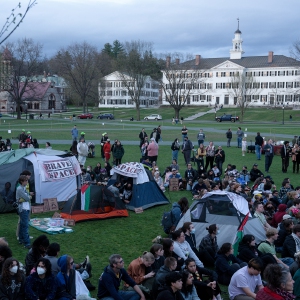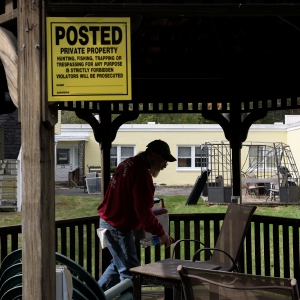Short-term rental debates pit Upper Valley property owners against neighbors
|
Published: 03-01-2024 4:35 PM
Modified: 03-21-2024 10:14 AM |
SUNAPEE — At first, Lisa Hoekstra was open to Sunapee’s plans to monitor short-term rentals.
Two years ago, she joined the town’s Short-Term Rental Task Force and began brainstorming ideas that she hoped would result in a policy that would be a win-win for short-term rental owners and the town.
But eventually Hoekstra became disenchanted with a process that she says was driven by a hidden agenda.
“A split occurred when it became obvious that the town administration were underhandedly seeking to severely restrict STRs,” Hoekstra said in an email.
In response, Hoekstra and her husband, Peter, started the Lake Sunapee Short-Term Rental Association in fall 2022 to advocate for the community’s short-term rental owners.
“(The debate) has been contentious and fraught with anger and broken trust between STR owners and town government,” Hoekstra wrote.
Sunapee — which passed a short-term rental ordinance at last year’s Town Meeting and is considering additional amendments this year — is one of a handful of Upper Valley lake communities including Enfield, Springfield, N.H., and Haverhill that are considering short-term rental ordinances this year. Short-term rentals typically are properties rented out for stays that are less than a month long.
Town officials say short-term rental ordinances address health and safety concerns, including lake quality and cars parked on the streets that can make it difficult for emergency vehicles to pass through.
Article continues after...
Yesterday's Most Read Articles
 Police seek assistance in locating missing Dartmouth student
Police seek assistance in locating missing Dartmouth student
 City cites Claremont property owner over demolition of building
City cites Claremont property owner over demolition of building
 Editorial: Dartmouth lets protesters know where they stand
Editorial: Dartmouth lets protesters know where they stand
 DHMC union organizers say they have enough signatures to force vote
DHMC union organizers say they have enough signatures to force vote
 A Life: Elaine Chase ‘was a very generous person’
A Life: Elaine Chase ‘was a very generous person’
But some short-term rental operators — including the dozens involved with LSSTRA — say the ordinances go too far and infringe on their rights as property owners.
“The LSSTRA isn’t against reasonable, equitable and enforceable regulations,” Hoekstra wrote in an email. “We would support a volunteer registration process. But the behemoth that Sunapee has created is much too heavy and costly for the town and STR owners to bear.”
Short-term rentals of some sort have, to some degree, existed in communities for years. In the last decade, however, the landscape has changed with the arrival of short-term rental businesses like Airbnb and Vrbo.
An October 2023 report from New Hampshire Housing, a nonprofit organization that assists low and moderate income homeowners and renters, analyzed data from 2014 to 2023 from AirDNA, a company that gathers information from Airbnb and Vrbo. One of the goals of the study, according to the report, was to figure out the impact short-term rentals have on the housing market.
“The most important claims to evaluate were that the rise of online short-term rentals has caused rents to increase and vacancy rates to decrease,” according to the study. While it found that it was “highly unlikely” that short-term rentals raised median rents, it did note that they contributed to lower vacancy rates for rental properties.
“Roughly 14% to 23% of the decrease in rental vacancy rates from 2014 to 2021 can be attributed to an increase in STRs over that period,” according to the study. “STRs have had a minor but statistically significant impact on the statewide rental vacancy rate.”
Housing the U.S. Census Bureau classified as “seasonal, recreational or occasional use” stayed “roughly the same.” The exception was Sullivan County, where Sunapee sits. It was the only New Hampshire county that saw a roughly 5% increase; all the others were around 2% or less.
While there have been legislative efforts to try to address short-term rentals at the state level, they have fallen short and a bill has yet to be passed in Concord.
“The state has really left it up to municipalities,” Renée Theall, a housing navigator and associate planner with the Upper Valley Lake Sunapee Regional Planning Commission, said in a phone interview.
That means as towns have taken positions and passed ordinances, there are differences at a fundamental level: the way each town defines a short-term rental varies, particularly in how many days qualify as a short-term stay.
Hanover’s zoning ordinance limits short-term rentals to specific districts and specifies the length of time each unit can be rented out.
Hanover voters approved a zoning ordinance in 2020 that limited short-term rentals to 90 total days a year for homes that are the owner’s main residence; of those 90 days, the owner must be present for at least 60 of them, meaning they can rent their home while not on the premises for a total of 30 days maximum.
All short-term rentals are subject to a town inspection.
“Our goal is to limit the loss of housing to investor-owned housing to short-term rentals,” Robert Houseman, the town’s director of planning, zoning and codes, said in a phone interview. “We know that Hanover has a certain market (for events) such as graduation, alumni weekend and homecoming where there’s opportunities to rent, and this will allow that.”
A separate regulation covers seasonal rentals, which are allowed up to 182 days per year and are only permitted in the Goose Pond and Forestry districts, where there are no year-round dwellings allowed, Houseman said.
Sunapee’s ordinance requires a yearly $350 registration fee after an initial permit and a contact on record who lives within two hours of Suanpee who is available 24/7 in case any issues arise. Owners must provide all guests a book containing information about town policies, and there must be at least one parking space per bedroom.
The regulation covers dwellings that are rented for fewer than 30 days, excluding inns and bed and breakfasts. It also limits the locations in town where short-term rentals are allowed.
Property owners who are found to be out of compliance could have their permits revoked and face fines.
This March, voters will decide on a updated ordinance that will limit short-term rentals at properties that are not owner occupied to 120 days a year.
Other proposed revisions to the current ordinance would allow three people to stay in each bedroom in a house, as opposed to two in the current ordinance, but would cap the number of people who can stay in a short-term rental at 16.
That’s concerning to Eric Callum, who with his wife purchased their home on Sunapee’s Mountainview Lake a few years ago. They viewed it as both a place to live and a source of income.
The longtime Unity residents pictured retiring at the two-bedroom home with around 55 feet of lakefront access. In the meantime, they’d rent it out as a short-term rental to help pay for their expenses when they were not using it for their own family. They charge around $230 per night.
“This is a way for us to own a little piece of Sunapee,” Callum said during a January interview at Sunapee’s Abbott Library along with Hoekstra and other short-term rental hosts.
Callum and Hoekstra, as well as other members of LSSTRA, said what Sunapee is proposing is government overreach. They argue that the town already have policies in place — such as noise ordinances — that deal with quality of life concerns. They also contend that they contribute to the town’s tourism economy and tax base by bringing people to the area as well as paying the state’s meals and rooms tax through listing agencies such as Airbnb.
“The cost to us emotionally to have to fight this when these are our rights as property owners, with us (is) huge,” Hoekstra said in an interview alongside Callum.
Hoekstra and her husband rent out a small studio that is attached to their home for around $108 a night. Hoekstra, who also has a long-term rental on her property, said that she would not consider converting her short-term rental into a long-term rental because she wants more flexibility.
“We didn’t want to do long term in this particular space because it is part of our house and we wanted it available for friends and family,” she said. “And the money is better. Yes. I won’t deny that the money is definitely (better).”
The Hoekstras also are currently suing the town of Sunapee in New Hampshire Superior Court after the town issued them a cease-and-desist letter about a camper they started renting out on their property in 2022.
In 2023, voters approved part of an ordinance that would prohibit those types of rentals. This year, residents will vote on an amendment to last year’s short-term rental ordinance that adds recreational vehicles and tents to a list of “mobile enclosures” that cannot be used as short-term rentals.
Sunapee short-term rental owners also contend that the town has overstepped legally and cite a 2023 court case Conway v. Kudrick, which they say gives them the right to do what they want with their homes.
In that case, town officials said that town ordinances prevented short-term rental owner Scott Kudrick from operating short-term rentals in residential areas, according to an article in the New Hampshire Business Review. The ruling stated that under Conway’s zoning ordinance, as long as homes were being used as residences, they cannot be prohibited for use as short-term rentals — even if the owner does not live there. Hoekstra and others said that since their short-term rentals are being used as homes, they should be allowed to operate wherever homes are permitted.
“Municipalities wishing to regulate STRs should review their zoning ordinances to determine whether the terms used are sufficiently clear that an average person will understand what qualifies as an STR and where STRs are and are not allowed within the municipal boundary,” the New Hampshire Municipal Association wrote in a summary of the case that appeared in its 2023 court update edition.
Supporters of Sunapee’s ordinances say they help provide the town with information about properties being used as short-term rentals and are a matter of public safety.
“Sunapee is not an anti short-term rental community at all,” said Ann Bordeianu, who serves on a Short Term Rental Task Force that was started in 2022 with the purpose of discussing concerns around short-term rentals in Sunapee and suggesting regulations for the Selectboard and Planning Board. “We embrace businesses and we want to support the tourism in Sunapee, but we need to do that in a balanced way so that the residents are protected as well as far as quality of life attributes.”
The effort began after residents raised issues about short-term rentals in the Sunapee Harbor area that they said were creating more noise and parking issues, among other quality of life concerns.
As time went on, residents who lived in other areas of town brought their concerns to the task force including ones that long-term renters were being displaced in favor of short-term rentals.
“I think that there’s a lot of positive things about them, but I do think that there should be some regulation around them so that everybody can live in harmony together,” Bordeianu said in a phone interview. “That’s what zoning is all about.”
Residents in Enfield, Haverhill and Springfield also will consider short-term rental ordinances this year.
Enfield’s proposed ordinance has been in the works for a few years and will require a simple majority to pass. During the COVID-19 pandemic and over last summer, town officials started to receive more complaints, Town Manager Ed Morris said. Some were related to parking, speeding and noise. Others expressed concerns about lakefront septic systems.
“I would much rather be proactive and stop damage to our lakes rather than go ‘there’s damage to our lakes let’s figure out what to do about it,’ ” Morris said. “Do you wait until you have problems or do you try not to have problems?”
Enfield’s ordinance requires short-term rental owners to get a permit and renew it for $100 each year. The permit requirements include a property inspection, having a contact person within an hour’s drive of the short-term rental, a building inspection, onsite parking for all vehicles, a limit of two people per bedroom plus two additional people, and proof that the state’s room and meals tax is being paid.
It calls for some exceptions: For example, homeowners who rent their home for fewer than 14 nights per year do not need a permit or inspection.
This year, Springfield voters will decide on an ordinance that would clarify that a short-term rental is rented for fewer than 30 consecutive days, and require that people who have short-term rentals obtain a special exception and site plan review in order to be granted a permit to operate.
“The use of any type of property as a short-term rental constitutes a type of guest facility requiring a special exception and site plan under this ordinance and is classified as a business/commercial use rather than as residential use,” according to the proposed ordinance. “Short term rentals do not count toward workforce housing and are not a home occupation or a home business.”
Haverhill residents will vote on a “short-term lodging ordinance” at Town Meeting that requires offstreet parking, “a properly maintained and adequately functioning septic system,” and assurance from property owners that trash will be removed from the property, among other requirements. Owners also are required to register for $250 and undergo an annual safety inspection. Each year they will have to renew their registration for $50.
Haverhill Town Manager Brigitte Codling said that the goal of the ordinance is simply for town officials to know where short-term lodging options are in town so that they know they’re safe. She said that there are around 28 short-term lodging rentals in Haverhill, based on counts staff have done by researching rental sites such as Airbnb, but that that number is likely an under count.
Codling emphasized that the town is not looking to restrict property owners from using their homes as short-term rentals.
“We just want to know they exist so we can ensure health and safety,” Codling said in a phone interview.
The majority of the rentals are in the Mountain Lakes district of town, which includes two popular bodies of water used for recreation. In recent years, there has been at least one short-term lodging spot near a lake that has had a septic system failure, Codling said.
Renters have also made calls to 911 using cellphones and are unable to tell emergency service providers an address or where the rental they are staying at is located, which has made it more challenging for emergency service providers to respond to calls, she said. Another concern is parking, particularly in the Mountain Lakes district which has narrow roads.
“A lot of these little cabins or houses have parking for two but when you have 12 people, a lot of cars are parking on the street and we can’t have that,” Codling said, adding that that can make it difficult for plows and emergency vehicles to get through. “That becomes an issue.”
Liz Sauchelli can be reached at esauchelli@vnews.com or 603-727-3221.
CORRECTION: At Town Meeting 2024, Springfield residents considered language clarifying that a short-term rental is rented for fewer than 30 consecutive days, and requiring that people who have short-term rentals obtain a special exception and site plan review in order to be granted a permit to operate. A previous version of this story incorrectly described the ordinance.










 Developer seeks to convert former Brookside nursing home to apartments
Developer seeks to convert former Brookside nursing home to apartments
